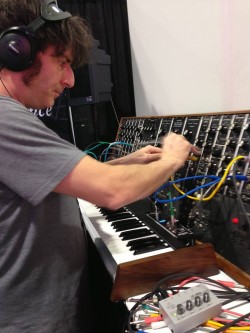 The Bob Moog Foundation announced today, at the 2014 NAMM Show, significant additions to the Asheville-based foundation’s archives,
The Bob Moog Foundation announced today, at the 2014 NAMM Show, significant additions to the Asheville-based foundation’s archives,
Michelle Moog-Koussa, executive director of the Bob Moog Foundation (BMF) and Bob Moog’s daughter, announced the additions, including:
- over 1,000 schematic drawings from 1965 to 1985;
- several rare prototypes, including:
- a Moog Apollo synthesizer (the Apollo became the prototype for the Polymoog);
- the Moog Liberation;
- the Moog 1130 Drum Controller;
- Moog Sequencer;
- Moog Song Producer;
- Moog Feedback Suppressor; and
- Production models of the Minimoog and a Moog Vocoder.
“These instruments and drawings join our growing collection of treasures that includes, among other items, Roger Powell’s custom dual-keyboard controller, designed by Bob; a duophonic Minimoog; and two vintage theremins.”
“We are thrilled with the ongoing interest our archives are generating from organizations and individuals,’ Moog-Koussa said.
These additions to the Foundation’s collection of documents and musical instruments come on the heels of the BMF’s receipt of a permanent loan of vintage instruments by the Music Department of University of North Carolina at Greensboro in December 2013.
Moog-Koussa said that 400 of the more than 1,000 documents received in this latest contribution have already been inventoried and entered into a searchable database.
“But that’s just the beginning,” she said. “We will soon begin the most detailed, formalized and time-consuming part of the archiving process – cataloguing. It takes time to do it right, and these materials are too important not to do it right.”
She anticipates that the cataloguing process will take between 12 and 18 months to complete. After that, the documents will be scanned and the most significant of them shared.
“Bob was generous with his talent and knowledge; inspiring others fueled his own creativity,” Moog-Koussa said. “We are doing that every day at BMF, just a little differently.”
The Bob Moog Foundation is a 501(c)(3) non-profit entity, and is independent from, not affiliated with and not supported by Moog Music, Inc.

Yawn. You want to excite me, scan and document everything and then make it available online for anyone to view/use, for free. Otherwise it’s just bragging about your hoard.
“She anticipates that the cataloguing process will take between 12 and 18 months to complete. After that, the documents will be scanned and the most significant of them shared.”
Believe it or not, though, the world isn’t here to excite you.
Why don’t you go there and help, if you want access?
Does the Bob Moog Foundation have a giant 20 foot tall bronze Bob Moog statue out front yet? If you’re gonna build a personality cult around a dude commissioning a larger than life mega statue is the first order of business! The archives can come later!
Please, Moog, come out with a new analog vocoder!!
Yup on,
have you looked at the PAIA vocoder? They still make them and they are super cool. Also super cheap.
I used to bag on the Moog Foundation until they spent a bunch of money buying crap used Moog parts from me on Ebay using their donation money.
Nothing like making a bunch of money for $4 worth of parts through mismanagement and ignorance. Go BMF!
With 3 or 4 people paid for a year to a year and a half scanning documents, they can pay themselves another $70K-$120K doing what a few kids could do with a scanner and a free weekend or two. Then watch… they’ll charge to see them afterward.
Bob sure would be proud. He could build a synth in that time for the same money.